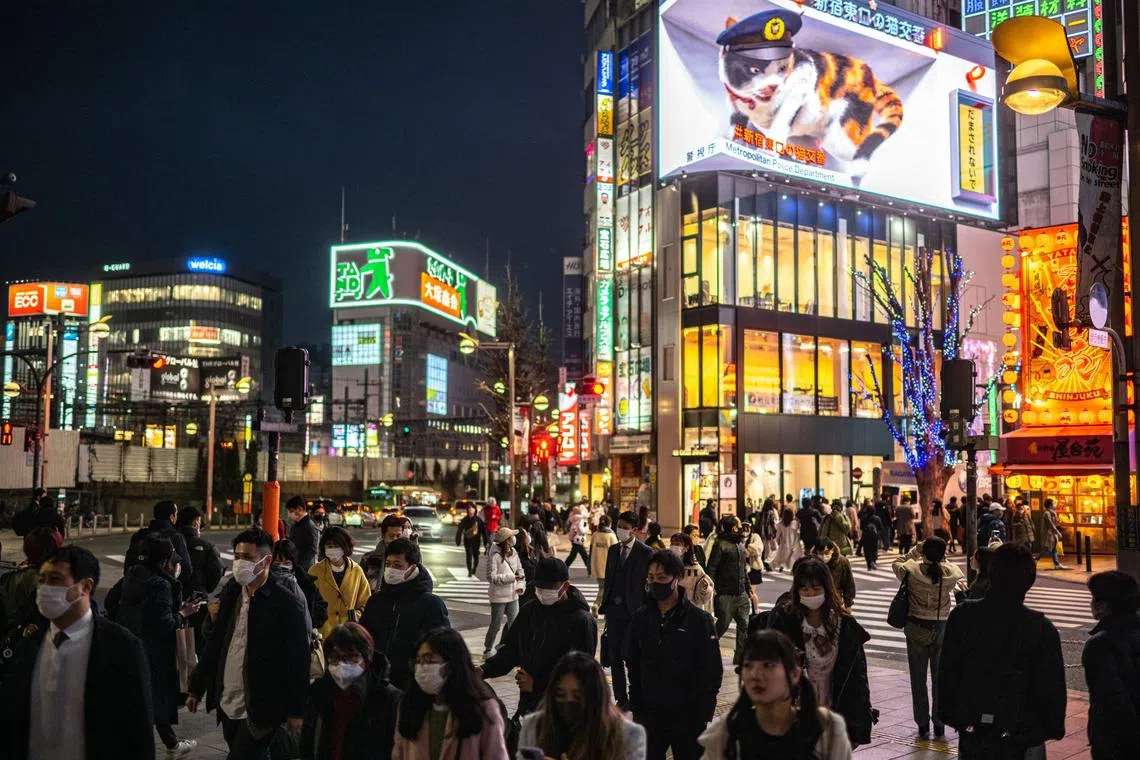Packed with tourists, Japan returns to economic growth
Sign up now: Get insights on Asia's fast-moving developments

Japan is again open for business, and tourist spots are packed and hotels are booked out in advance.
PHOTO: AFP
TOKYO – After more than two years under some of the world’s tightest border controls, Japan is once again open for business.
Tourist spots are packed. Hotels are booked out well in advance. And it is getting harder to get a seat at many of the country’s best restaurants.
While that has not been ideal for the many people who flocked to Japan in late 2022 hoping to experience its famous hospitality, it has been pretty good for Japanese businesses.
The country’s economy, the world’s third largest after the United States and China, grew at an annualised rate of 0.6 per cent from October to December, government data showed on Tuesday.
The modest increase, driven by a recovery in private consumption and spending by visitors to Japan, lagged expectations that growth could reach 2 per cent.
The uptick followed a surprise contraction during the third quarter of last year, when inflation and a weak yen drove import prices up and suppressed spending.
The latest quarterly result capped off a second straight year of economic growth for Japan, which has traced a slow and sometimes uneven path to recovery from the economic devastation of the coronavirus.
Japan’s economy expanded in 2022 by 1.1 per cent in real terms, government data showed. That followed growth of 2.1 per cent in 2021.
While Japan has now recovered the ground it lost during the pandemic, its growth lagged that of other countries, as lingering concerns about Covid-19 continued to keep people in their homes and suppressed demand.
The return to growth in the fourth quarter was partly driven by a recovery in domestic consumption, said Mr Shinichiro Kobayashi, principal economist at Mitsubishi UFJ Research and Consulting.
One big reason for that is that people in Japan, with the government’s encouragement, have begun to adjust to life with the coronavirus.
While deaths have shot up to their highest levels since the pandemic began, many people in Japan have let their guard down.
“The suppressed demand has steadily picked up,” Mr Kobayashi said.
That rebound has been supported by the return of popular government subsidies aimed at encouraging people to travel and eat out.
With tourists flooding back into the country, the yen’s weakness has also become a net positive for some business sectors that benefit from their return, said Mr Saisuke Sakai, senior economist at Mizuho Research and Technologies.
Tourism has bounced back faster than expected, and “there’s revenge spending by people who have been waiting out the coronavirus”, he added.
He also noted that the cheap yen had encouraged visitors to spend heavily on products such as make-up and luxury goods.
But not all the news was good.
The soft yen has continued to drive up prices for food and energy, both of which are highly import-dependent.
Inflation was 4 per cent in December, its highest level in more than 40 years.
That takes a big bite out of wages, which have seen little growth for decades.
Mr Kobayashi sees more room for the economy to expand as Chinese tourists begin to return in greater numbers.
Japan has placed some restrictions on visitors from China because of concerns about the country’s surge in coronavirus cases since its zero-Covid policy ended.
While there is some concern that the US or Europe could enter a recession this year, Mr Kobayashi expects that “demand will continue to lead modest growth for some time” in Japan.
Mr Takahide Kiuchi, executive economist at the Nomura Research Institute, said that many of his Japanese colleagues believed that Japan’s economy could expand faster than those of the US or Europe this year, as consumption continues to rebound.
But for his part, he is less optimistic about Japan’s prospects.
“External factors may undermine the growth momentum of the Japanese economy,” he added, pointing to the uncertain economic situation abroad.
“I personally expect that the Japanese economy may fall into a mild recession in the middle of this year.” NYTIMES


